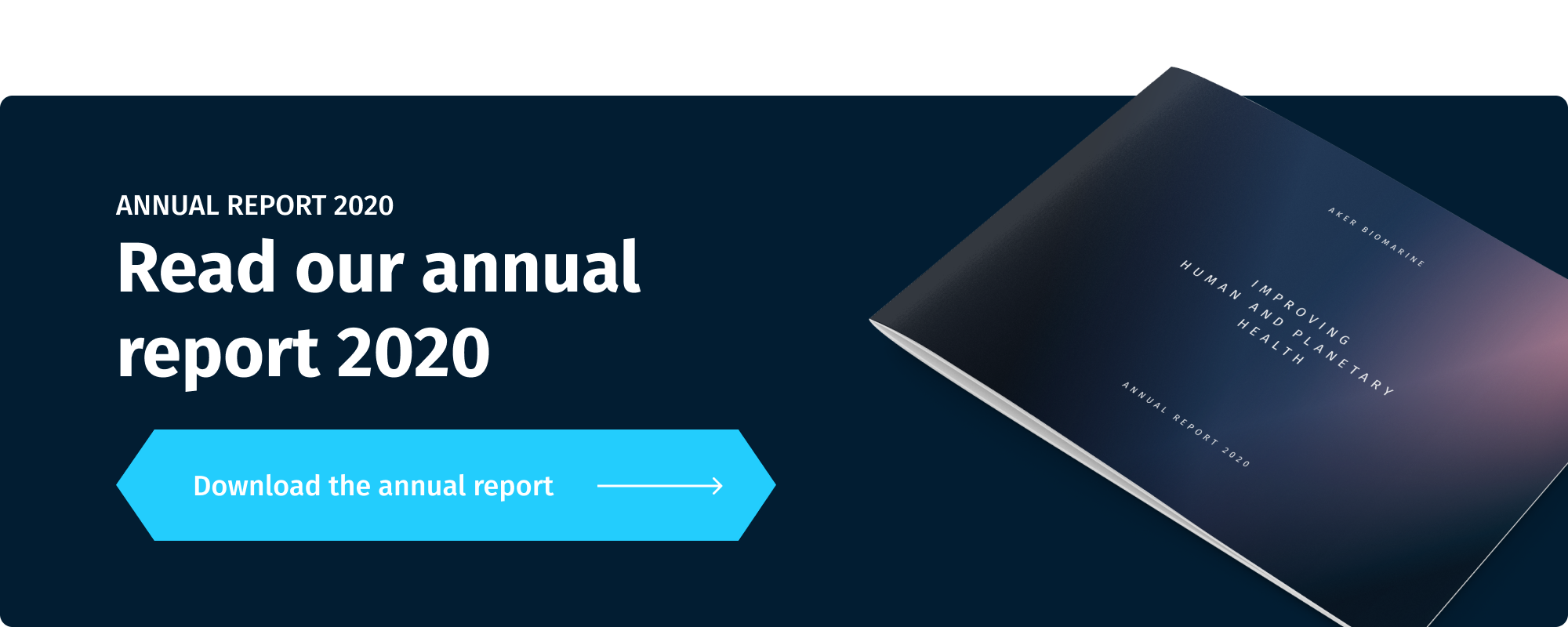Managing and developing a business such as Aker BioMarine is challenging. But the challenges we are up against to secure health and well-being for generations to come are massive.
In 33 years, there will be 10 billion people on this planet, which means food production will need to increase by 69 percent in the same period. This is in addition to already stretching Earth’s resources. According to The Global Footprint Network, we are already consuming 60 percent more resources than what is renewed each year.
We might feel that we are getting healthier, going to the gym, drinking our smoothies, but the reality is the opposite. Statistics show that we are becoming unhealthier because of the lifestyles we choose to live. Currently, lifestyle diseases are overwhelming people as well as society at large. A report from the World Economic Forum says that during the next 15 years healthcare costs related to treating lifestyle diseases will accumulate to more than USD 22 trillion globally.
There is hope
The future looks gloomy right now, but what if we could find a way to change it? That’s what we are striving to do at Aker BioMarine, starting out with oceans. Seventy percent of the planet’s surface is covered by oceans, but it accounts for just two percent of the calories we consume and is a source for less than 0.5 percent of all pharmaceutical products. We need to look toward our oceans for solutions.
Businesses that are addressing the global challenges today will be more profitable and have greater growth potential in the future. That’s why Aker BioMarine’s products, strategy and mission are focused on solving the global challenges.
Contributing to more efficient food production
Aker BioMarine’s QRILL Aqua products are documented to drive growth and enhance health and quality of farmed marine species. For example, our feed ingredients helped boost our customers’ salmon production by an additional 175 million servings in 2016.
Helping prevent lifestyle diseases
The unique phospholipid-bound omega-3s in our Superba Krill Oil products reduce the risk of several lifestyle diseases, including heart and brain-related issues. In 2016, about one billion doses of Superba Krill were sold worldwide, improving the health of millions of people. A 2016 study published by Food Supplements Europe demonstrated that for every Euro a consumer spends on omega-3 products, savings of €2.3 are generated in the healthcare system. Based on this estimate, Aker BioMarine potentially reduced society’s healthcare costs by more than USD 1 billion in 2016.
Producing and consuming responsibly
With help from our peers, suppliers, and customers, we are taking steps to reduce our environmental footprint throughout our entire value chain. In 2016, we mapped the company’s global energy consumption and greenhouse gas emissions, and in 2017 we will continue our journey to make our company even greener. Our next goal is to complete a comprehensive review of our waste streams and water use.
The new standard for sustainable harvesting
The Antarctic krill fishery is one of the world’s most sustainable fisheries. Aker BioMarine is specifically noted for near-zero by-catch, fully transparent operations, and MSC certification, the highest sustainability standard for fisheries worldwide. In 2016, for the second year in a row, the krill fishery received an “A” rating from the Sustainable Fisheries Partnership as the only reduction fishery in the world in “very good” condition.
Business challenges for Aker BioMarine
Pioneering is demanding. For every victory, there are numerous disappointments. 2016 was a year with both disappointments and great victories. The omega-3 market where we compete with our Superba ingredient continued to be weak. Lack of market growth and tough competition resulted in decline in our nutraceutical business. When the headwinds were the strongest, we decided to invest in innovations – innovations that were demanding for our organization to implement within our ambitious timelines and costly for our company. But new innovations have paid off and in 2016 we successfully launched our new Superba products with the objective to turn around our nutraceutical business.
Growing global aquaculture production at high prices resulted in a good year for our aquaculture business. Strengthened scientific documentation of the QRILL products and positive customer experiences have lifted demand.
Across all of our product divisions, we have shifted gears regarding the way we work with customers. It is not enough to just deliver an attractive ingredient, we also need to provide relevant market insights, marketing and product ideas and contribute actively to our customers’ success. In 2016 we started transforming our sales and marketing functions to build relevant content and stronger, interactive customer relationships.
Even if 2016 was a good year for Aker BioMarine, with USD 117 million in revenue and USD 35.6 million in EBITDA, we posted slightly negative earnings after tax. The investments needed to build a supply chain for krill-based products, the resources needed to innovate and document their biological effects, and the time needed to develop new markets are reflected in our earnings.
Having a supportive owner in Aker ASA that has a long-term vision has been vital to Aker BioMarine’s development. In 2016 we became stronger both financially and organizationally and we are ready for the new challenges and victories ahead.

